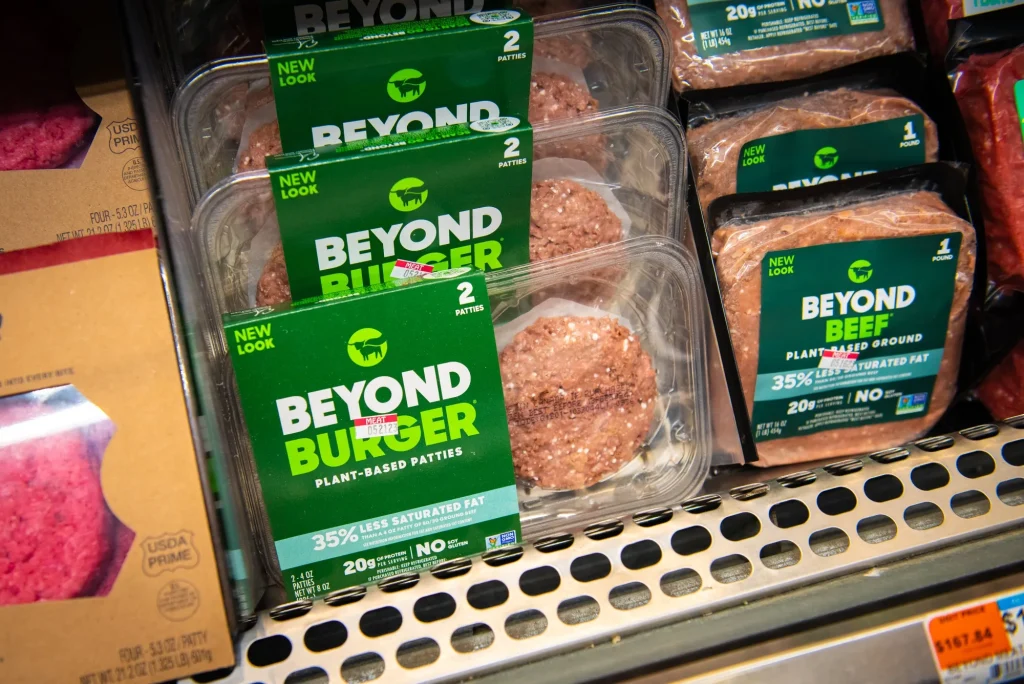Beyond Meat Inc Stock: Is It Time to Invest in the Future of Plant-Based Protein?

As the world increasingly shifts towards sustainable living, the plant-based protein market has emerged as a promising frontier for investors. Beyond Meat Inc., a trailblazer in this culinary revolution, has captured the imagination of health-conscious consumers and environmentally-aware investors alike. With rising demand for alternatives to traditional meat products, the question looms: Is it time to invest in Beyond Meat Inc. stock? As industry trends evolve and consumer preferences tilt towards plant-based options, understanding the company’s potential offers a window into the future of food.
This article delves into Beyond Meat’s performance, market dynamics, and strategic initiatives, equipping you with insights to make an informed investment decision. Join us as we explore whether Beyond Meat is ready to thrive in this burgeoning sector and what it could mean for your portfolio in the long run.
Overview of the Plant-Based Protein Market
The global plant-based protein market is experiencing rapid growth, with projections valuing it at 21.57 billion by 2030, up from 12.9 billion in 2021, reflecting a 6.2% CAGR. Key drivers include rising health consciousness, environmental sustainability concerns, and the growing popularity of flexitarian diets. North America dominates the market due to strong consumer demand for sustainable and ethical food alternatives, while Asia-Pacific is emerging as a high-growth region, particularly for plant-based dairy.
Soy and pea proteins currently lead the market, with pea protein isolates gaining traction for their digestibility and versatility. However, geopolitical tensions and supply chain disruptions—such as wheat shortages caused by Russia’s invasion of Ukraine—pose risks to raw material availability. Despite challenges, innovations in food tech and expanding applications (e.g., pet food, nutritional supplements) are unlocking new opportunities.
Beyond Meat’s Business Model and Product Line
Beyond Meat (NASDAQ: BYND) operates as a plant-based meat innovator, targeting flexitarians with products designed to mimic the taste and texture of animal protein. Its core offerings include plant-based burgers, sausages, and ground meat substitutes made from pea, rice, and mung bean proteins. The company distributes through retail (e.g., Walmart, Costco) and foodservice partnerships (e.g., McDonald’s, KFC), leveraging brand recognition to drive adoption.
Recent innovations include the Beyond IV product line, featuring cleaner ingredients like avocado oil and fava bean protein, certified by the American Heart Association. Beyond Meat also emphasizes sustainability, claiming its products use 90% less greenhouse gas emissions and 99% less water than traditional meat production. Strategic expansions into Europe and China aim to capitalize on rising demand in these markets.
Recent Financial Performance and Stock Analysis
Beyond Meat’s stock has plummeted 95% from its 2019 peak, trading at 3.43 (as of June 2025)。 The company reported a 20% revenue decline in early 2025, driven by weak demand, price sensitivity, and competition. Gross margins improved to 12.8% in 2024 (vs. -24.1% in 2023), but net losses persisted at -52.9 million in Q1 2025.
Key financial risks include 1.1 billion in debt and a negative ROA of -23.04%. While a 100 million secured loan in May 2025 provided short-term liquidity, long-term viability depends on restructuring and cost-cutting measures. Analysts remain divided: some highlight gross margin recovery and international expansion, while others warn of unsustainable debt and market saturation.
Key Drivers of Growth for Beyond Meat
Sustainability Trends: Growing consumer awareness of climate change supports plant-based diets. Beyond Meat’s eco-friendly production aligns with global ESG goals.
Product Innovation: Beyond IV and partnerships with health organizations aim to rebuild trust and attract health-conscious buyers.
Global Expansion: New facilities in Europe and China target untapped markets, where plant-based diets are gaining momentum.
Strategic Partnerships: Collaborations with McDonald’s and Starbucks enhance brand visibility and distribution.
Risks and Challenges Facing Beyond Meat Inc
Intense Competition: Rivals like Impossible Foods, Tyson Foods, and Nestlé are flooding the market with cheaper alternatives.
Consumer Skepticism: Negative perceptions about taste, texture, and “over-processing” hinder repeat purchases.
Financial Instability: High debt, cash burn, and reliance on capital raises threaten solvency.
Supply Chain Vulnerabilities: Dependency on pea protein exposes the company to price volatility.
Competitive Landscape: Who Are Beyond Meat’s Main Rivals?
Beyond Meat competes with:
Impossible Foods: Known for heme technology and partnerships with Burger King.
Tyson Foods: A traditional meat giant investing heavily in plant-based lines.
Nestlé: Offers Garden Gourmet and Sweet Earth brands in retail and foodservice.
Kellogg’s MorningStar Farms: A legacy player with strong retail distribution.
Analyst Opinions and Market Predictions
Analysts are polarized:
Bull Case: Target prices of 70–100 hinge on successful restructuring, margin improvements, and global demand recovery.
Bear Case: Critics cite declining sales, debt risks, and market saturation, with some advising avoidance.
Technical analysts note short-term volatility, including a 56% premarket surge in April 2024 driven by short squeezes.
Investment Strategies for Beyond Meat Inc Stock
High-Risk, High-Reward Play: Suitable for speculative investors betting on a turnaround.
Diversification: Limit exposure to 1–2% of portfolios to mitigate volatility.
Monitor Key Metrics: Track gross margins, debt restructuring, and international sales growth.
Long-Term Horizon: Consider dollar-cost averaging during dips if bullish on plant-based trends.
Conclusion: Is Now the Right Time to Invest in Beyond Meat Stock?
Beyond Meat presents a high-risk opportunity in 2025. While the plant-based protein market is growing, the company’s financial instability and competitive pressures raise red flags. Short-term traders might capitalize on volatility, but long-term investors should await clearer signs of sustainable profitability and debt reduction.
Analyst consensus suggests caution: only consider investment if you believe in Beyond Meat’s ability to innovate, penetrate global markets, and outpace rivals. For now, conservative investors may prefer diversified exposure to the broader plant-based sector rather than betting solely on BYND.